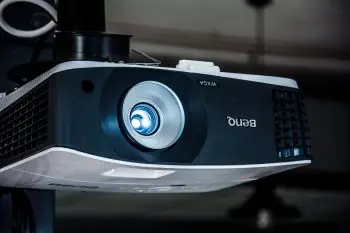Introduction
You see a lot of metrics when shopping for a projector. If you’re a first-time buyer like I was when I purchased my projector, then you might be just as confused as I was when the guy at the store was ringing off all the different specs. There’s a lot of questions that come to mind when you’re trying to buy a projector you’ll love and want to keep for years. One of these might involve the brightness of the projector and whether it has a good amount.
I did some research on this topic specifically involving projector brightness. This is an important aspect of a good home theater experience, but it’s important to know what to look for if you’re looking to buy or upgrade your set up. I already had a good understanding of what to look for in terms of projector brightness, but I looked more into it and learned some additional details that are worth sharing.
So is it possible for a projector to be too bright?
Yes, a projector can have too many lumens and not be able to effectively balance the color projection or display the finer details that make an image look great. There’s definitely a point where the image quality becomes over-saturated with brightness and doesn’t look appealing.
There’s also another point worth mentioning. It’s not a bad thing if you find a projector that has a lot of lumens (more than 3300). But, this doesn’t mean you should find the ones with the highest count and assume that’s the best quality. There are some other basic factors you need to look into to understand whether you’re getting a quality product or not.
Brighter Doesn’t Always Mean Better
Buying a good projector is all about balance. You don’t want a 4k resolution with a projector that only has 800 lumens or vice versa. If a projector has 3000+ lumens, then it absolutely needs to have a resolution higher than 720p native. Cheaper models (under $400) will try to appeal to buyers by having a ton of lumens, and they won’t hesitate to advertise that quality. But, a projector less than 1080p won’t be able to compensate for the brightness and you’ll be left with a level of color saturation you’re not satisfied with (not to mention the fact that it’ll hurt your eyes to look at for periods longer than an hour).
A projector that is too bright can also create The Oversplash-Effect. This is where light bleeds off the screen and reflects onto the ceiling and walls like a mirror reflecting light. This fills the room with more light than you want and it’s a real strain on the eyes. If you’ve tried a few projector models and still feel like light bleed is an issue with your set up, then the quick answer is to get a grey screen instead of changing the projector.
To reiterate make sure the projector resolution is 1080p or greater and comes with a level of brightness that can easily be adjusted. I’ve come across a few models that don’t offer a lot of flexibility when changing the brightness, so it’s important to know how many lumens the projector actually has. It’s annoying to have to find creative solutions to darkening the room or even adding light pollution to get the image quality you’re looking for.
When it Makes Sense to Buy a Bright Projector
I just want to reiterate that buying a projector with a lot of lumens is not always a bad thing. In this section, I want to point out several instances in which it makes absolute sense to buy a bright projector without breaking the bank on resolution:
- Watching outdoor movies: People are less concerned with having fantastic image quality when watching outside than they are in a dedicated home theater set up. When my family upgraded to a projector with 2200 lumens (a higher than average amount), we were able to start watching movies at dusk instead of waiting until it was late at night with no light pollution. A bright projector can compensate for light pollution well.
. - Watching movies in an area with considerable light pollution. I mentioned this one earlier, but this is the single best reason I can think to get a brighter than average projector. Living rooms or areas where people are doing more than sitting and watching movies fit in this category. A wet bar in the back of the room or a nearby pool table area will require some ambient light. A bright projector will be able to compensate for set-ups like this (and the ambient light could even enhance the image quality depending on the screen you have).
. - If the projector you already have is too dim. I did a quick, over the shoulder video that compared a budget $150 projector and my newer Epson 2045 one. You can see the difference in brightness.
..
. - If You Plan to Get an Ambient Light Rejecting Screen. These screens do an excellent job of reducing light bleed or over-splash / reflection. Most ALR screens are grey and they sharpen image quality to level of 4k resolution. They’re not that much more expensive than regular screens, and they will allow you to make your projector image brighter AND sharper.
This article on ALR screens has a good video that shows you the difference they make with respect to projector brightness and image quality.
Related Questions
When should I increase the brightness of my projector? It makes the most sense in situations where you need to compensate for light pollution. It also depends on the movie you’re watching. If you’re watching something like the Dark Knight Rises, and know there will be a lot of dark, shadowy scenes, I recommend bumping up the brightness a little bit. If you’re buying your first projector, then play around with the settings. There’s a lot of ways to increase image quality. Don’t just stick with the default settings if you think they could be better.
How many lumens should a projector have? Anywhere from about 1400 – 2500 is a good amount. Some will have lumens as many as 3000+ as I mentioned earlier, but I think this is way too much if you’re just a first-time buyer. The projector I have is around 2200 and it’s perfect for indoor and outdoor movies. I haven’t felt a need to get anything brighter. In every situation where brightness was an issue, I just found creative ways to make the room darker.
How do I know if my projector is too bright? You’ll likely notice it if you feel eye strain after only an hour of use. Also, take a look around the edges of your screen. Does it seem like there’s an aura of white light reflecting on the ceiling and surrounding walls? That in itself isn’t always a good determinant, but it will tell you if over-splash is occurring. Adjust the projector brightness and your color settings. I call Best Buy for many of these issues. They do free in-person consultations and they’ve helped me with questions specific to my situation (I’m not sponsored by them at all, I just know their home theater guys are very knowledgeable about all these issues).
A Final Note on Projector Brightness
This article was ultimately meant to help you understand the situations in which a projector can be too bright for your needs. You want a projector that can easily balance color rations, brightness, and sharpness without greatly sacrificing any one of them when one is adjusted. This isn’t unrealistic to ask of projector models, and the most common, highly rated models will do this the best. If you currently don’t own a projector, then I highly recommend this article on my first dedicated projector purchase. It’s the one I currently use and it’s been a great benchmark for me to reference when looking at other models if I ever plan to upgrade.
There’s also one more thing I want to mention in regards to projector brightness. If you’re really stuck wondering what to do if you think your projector is too bright or you’re concerned about buying one that is, consider whether the model has Eco Mode. This is like a power-saving mode than decreases both the noise and slightly lowers the brightness of the projector. I’ve used this on my Epson 2045 but it was mainly for decreasing the fan noise during the hot summer months in California. I can imagine that a bright projector will look more standard if left on this setting instead of the default.
As always, if you have any questions or comments, feel free to reach out at entertainmentden.ns@gmail.com and I’ll do my best to respond! I’m also taking article topic suggestions if you feel I’m missing anything worth mentioning.

